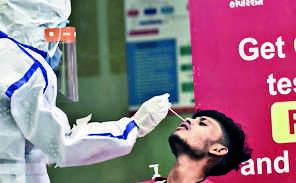- Industry
- 2 min read
New COVID cases up 306 per cent in Punjab, but testing stays low
Notwithstanding the steep rise in cases, health authorities are yet to ramp up screening. Between March 17 and 29, 22,062 tests — 1,575 tests per day on an average — were conducted in the state using both reverse transcription polymerase chain reaction (RT-PCR) and rapid antigen test (RAT) methods.An analysis of data shows the lowest number of testing in a day over the past 14 days stood at 486 on March 24, followed by 546 on March 20, 944 on March 27 and 1,208 on March 21.
Notwithstanding the steep rise in cases, health authorities are yet to ramp up screening. Between March 17 and 29, 22,062 tests — 1,575 tests per day on an average — were conducted in the state using both reverse transcription polymerase chain reaction (RT-PCR) and rapid antigen test (RAT) methods.An analysis of data shows the lowest number of testing in a day over the past 14 days stood at 486 on March 24, followed by 546 on March 20, 944 on March 27 and 1,208 on March 21. The trend of testing indicates that the state at present is only testing patients seeking medical attention.
Despite low testing, seven districts in the state have a weekly test positivity rate higher than the all-India average of 1.91 per cent. One district has a positivity rate well over the 5 per cent limit prescribed by the World Health Organisation (WHO). Mohali had the highest weekly positivity rate of 6.4 per cent, followed by 4.26 per cent in Faridkot, 3.7 per cent in Pathankot, 3.64 per cent in Nawanshahr, 2.59 per cent in Amritsar, and 2.38 per cent in Fazilka.
In last one week, the proportion of rapid antigen tests, in the overall number of tests in weight districts (34.78 per cent) of Punjab, was higher than reverse transcription polymerase chain reaction (RT-PCR) tests. In the seven-day period, rapid antigen accounted for 94 per cent of the total tests in Mansa, 87 per cent in Gurdaspur, 60 per cent in Fazilka, 59 per cent in Muktsar and Patiala, 54 per cent in Faridkot, and 53 per cent in Sangrur.
Taking note of the spurt in COVID cases, Sangrur-based public health expert Dr Amandeep Aggarwal urged the government to increase screening of vulnerable population so that the spread of virus can be contained. He suggested that the government should enhance surveillance and ensure compliance of safety norms, which at the moment is not being done.



COMMENTS
All Comments
By commenting, you agree to the Prohibited Content Policy
PostBy commenting, you agree to the Prohibited Content Policy
PostFind this Comment Offensive?
Choose your reason below and click on the submit button. This will alert our moderators to take actions